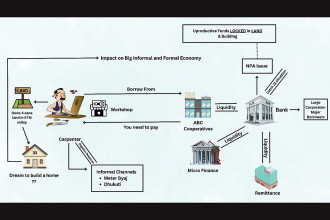
In recent years, Nepal’s payment services industry has witnessed remarkable growth, with an increasing number of payment service providers (PSPs) emerging to offer a diverse range of payment services such as mobile payments, online payments and card payments. Nepal currently has 27 payment service providers, and 10 payment service operators (PSOs), and the number will keep expanding once the business environment accelerates making it an investor-friendly venture. This growth is driven by several factors, including the increasing use of mobile phones, growth of e-commerce, and the government’s efforts to promote financial inclusion.
Meanwhile, Nepal Rastra Bank has begun its homework in preparing Financial Inclusion Index to measure the actual status of financial access. In the last 10 years, the internet penetration graph has taken an upward direction wherein the post Covid area turns out to be a boon for the digital industry. The number of transactions via e-wallets took a big leap from 124,945,099 in fiscal year 2020-2021 to 167,491,933 in 2021-22, while the number of transactions rocketed from 111,923,386 in 2020-2021 to 181,545,676 in 2021-2122. connectIPS, e-wallets, mobile banking, internet banking, QR code and cards have been the go-to means for financial transactions and thus stood in affirmation. The blend of social media and e-commerce with businesses integrated within social media like Facebook, Instagram, and TikTok is fuelling the use of digital payment transactions. Nepal’s rising internet penetration with 15.5 million users recorded at the start of January 2023 is a prospective expansion of the digital payment industry and the number will keep rising once connectivity reaches every nook and corner of the country.
The growth of the PSP industry has created a number of opportunities for businesses and consumers in the country. It has been a plus for consumers and companies as it offers a convenient and effective means to accept payments from customers and make payments for goods and services conveniently. However, the industry is surrounded by a rabbit hole on one side and a plethora of opportunities on the other. The surge in internet penetration rate is unparalleled to the indispensable digital literacy that is holding back further growth and amplification of PSPs. Having an internet facility or high internet penetration does not equal the digital awareness one has when it comes to digital payments. The purpose, operability and functionality of the digital payment system have to be grasped by the consumers, and it is high time the PSPs shift their focus to delivering digital awareness. On the other side, many Nepali individuals and businesses still harbour reservations about digital payments due to security and lack of familiarity with technology.
PSPs must invest in educating users about the benefits and safety measures associated with digital payments. Alongside, PSPs now have the added responsibility to adopt and consider the guiding ‘Principle of Financial Market Infrastructures’, as provided by Payment Systems Related Unified Directives No. 12 of 2079 issued by the central bank. Adoption of this principle exceedingly clears the bug out of risk management and streamlines the system.
While the usage is high among people in urban and semi-urban areas, rural areas are still awaiting accessible digital infrastructure. Nepal’s digital payment ecosystem heavily relies on internet connectivity and technological infrastructure. In rural and remote regions, where connectivity is limited, PSPs face challenges in expanding their services and reaching a broader customer base. The development of robust digital infrastructure keeping connectivity at the top of the pyramid remains crucial for the sustainable growth of PSPs.
Regardless, both the government and PSPs have extended their vision to inculcate digital reach among a majority of the population. It is also necessary for banks and financial institutions to integrate digital systems and shift their focus from traditional payment methods. A benefit of the doubt that Nepal and its contemporaries have is that Nepal is in the early stages of development in the digital payment industry. That holds true in most situations but cannot be the pretext to not address the different vulnerabilities that are in place as quickly as possible.
These vulnerabilities are inherent risks in their operation that then seeps in to consumers, merchants, agents, and so on. PSPs in Nepal and everywhere face the challenges of data security and cyber fraud. Since laws and regulations concerning information technology and data security do not give sheer assurance for the businesses as well as citizens, the risk persists perpetually. Electronic Transaction Act 2063, and the Consumer Protection Act of Nepal 2018 are insufficient to tackle the prevailing issues of data protection and cyber security. Payment service providers handle a vast amount of sensitive customer data, including personal and financial information. Ensuring the privacy and security of this data is of paramount importance to protect individuals from identity theft, fraud and unauthorised access. With the increasing number of digital transactions, the risk of security breaches, data theft, and fraud also rises.
Payment service providers must invest in robust cybersecurity measures, encryption technologies, and fraud detection systems to protect customer data and ensure secure transactions. This is arguably a first-task-in-hand in what the PSPs should do to gain the trust and confidence of people. Further, Nepal Rastra Bank has made it mandatory for the PSPs to have Anti-Money Laundering Policy to combat financial fraud and other breaches. The onus is on the PSPs to make the policy airtight and minimise the harm. Nevertheless, there needs to be more to do away with risks associated with digital payment systems. Similarly, businesses/investors expect a better framework from NRB. It is commendable that the central bank has increased the minimum paid-up capital amount requirement to Rs 50 million from Rs 10 million allowing improved cost resources for the operation and enhancement of the business but only a handful of PSPs in Nepal have a grip over the ceiling, while others are merely hanging by a thin thread. On the brighter side, NRB has opened the doors to foreign investment in the digital payment system allowing investment of 15% of the paid-up capital of the company.
However, for a PSP initiating a business with the minimum ceiling of paid-up capital, the thirst remains unquenched. In consideration that the paid-up capital can be increased, 15% foreign direct investment (FDI) is still inadequate to serve dire investment needs as the amount is barely enough for business expansion, rather it can be useful to avail foreign technology integration. Revision to this policy is necessary to allow more investments and foster businesses as has been the case in other countries. For instance, India allows for 100% foreign investment in financial service sector, same goes for Bangladesh. To keep PSPs functioning and update with global trends in the digital payment system, there needs to be more investment, inter alia, in the technology. Further, a nexus has to be built with internet service providers (ISPs) in Nepal or there has to be an investment in the ISP sector enabling consumers to avail internet in a cost-effective way. The digital transaction curve rises significantly if the data/internet prices in Nepal are cheaper. Data prices in India are comparatively cheaper and affordable to all and PSPs have heavily benefitted from this. In the Nepali context, costly data charges bar consumers from making payments digitally. Lower data and internet costs make financial services more accessible to a larger population leading to establishing a strong customer base and reaching a border market with high adoption rates.
A ray of hope that the government is prioritising digital payments stems from the recently signed memorandum of understanding with India for cross-border digital payments. This has other implications though along with additional requirements. The cross-border digital payment pact with India means the legislation should now address the complexities associated with cross-border data transfers. It should define requirements for secure data transfers, including encryption, data localisation, and adherence to international data protection standards. From a business perspective, it calls for more investments to strengthen data security. This has more to do with consumer rights in light of the digital consumption of data and services. The Consumer Protection Act of Nepal does not address consumer data protection and security on the premise of digital payment/digital transactions. Nepal needs a comprehensive Consumer Data Protection Act for the protection of consumers. Comprehensive legislation would provide consumers with explicit rights regarding their personal data, including the right to consent, access, correction and deletion. It would establish a framework for PSPs to handle consumer data transparently and responsibly. Further, the Consumer Data Protection legislation should necessitate PSPs to establish protocols and procedures for managing data breaches effectively including timely notification of affected consumers, appropriate remedies, and cooperation with relevant authorities in investigations., and the mitigation of the dispute.
The gig economy is ever-growing in Nepal as many people are finding a comfortable space in freelancing. In the coming years, the gig economy’s contribution to Nepal’s economy will be significant and its financial aspect is sure to extend its root to the digital payment system. In Bangladesh, the gig economy is growing at an annual rate of 20%. Since Nepal lacks the presence of a global payment system, many have not been able to make or accept cross-border payments. Without global presence, Nepal’s digital economy works in isolation and its direct repercussion is faced by the people engaged in the gig economy.
Nepal’s government does a huge number of transactions as a merchant and the task would be easier with e-payment services. The door opens for PSPs to cash in on the bundle of opportunities and gain a competitive advantage. Nepal Rastra Bank has already prepared a preliminary draft of a feasibility study of Central Bank Digital Currency (CBDC), which will boost the digital payment industry once it has been implemented. The government’s resilience to nurture the growth of PSPs will definitely add another brick to the path of economic prosperity. And NRB will stay as a playmaker to balance the need of the payment service industry and the demand of consumers to withstand conventional transactional hassles and prolonged procedures. ![]()





-1758271497.jpg)
